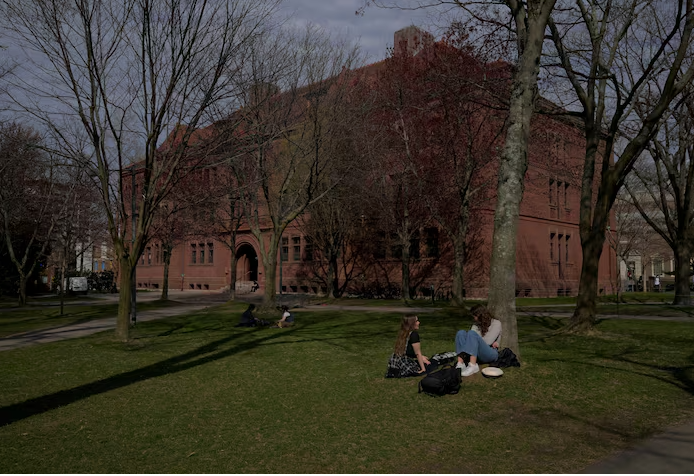
Shockwave in Academia: Homeland Security Revokes Harvard's Right to Enroll International Students

In a move sending shockwaves through the world of higher education, the U.S. Department of Homeland Security on Thursday revoked Harvard University’s ability to enroll international students, effectively terminating its certification under the Student and Exchange Visitor Program (SEVP). The unprecedented action under President Donald Trump’s administration now forces thousands of foreign students at the storied Ivy League institution to either transfer to other universities or face the loss of their legal status in the United States.
The announcement came from Homeland Security Secretary Kristi Noem, who declared that Harvard was no longer authorized to host international students due to what she described as “noncompliance with federal inquiries” and deeper concerns about national security and campus ideologies. “This administration is holding Harvard accountable for fostering violence, antisemitism, and coordinating with the Chinese Communist Party on its campus,” said Noem in a strikingly direct statement. “It is a privilege, not a right, for universities to enroll foreign students and benefit from their higher tuition payments to help pad their multibillion-dollar endowments.”
The decision is the latest and perhaps most dramatic escalation in the Trump administration’s broader campaign to confront what it views as ideological bias and foreign influence in elite American educational institutions. Harvard, a perennial symbol of academic prestige and influence, has frequently found itself at the center of conservative critiques regarding liberalism, free speech, and alleged favoritism toward foreign actors.
Harvard officials responded swiftly, calling the move “retaliatory, illegal, and deeply harmful” to both the university and the global academic community. “The government’s action is unlawful. We are fully committed to maintaining Harvard’s ability to host international students and scholars, who hail from more than 140 countries and enrich the University – and this nation – immeasurably,” the university said in a strongly worded statement. It remains unclear what legal recourse Harvard will pursue, but insiders suggest the university is preparing to file an emergency injunction in federal court to halt the policy.
While the White House did not immediately comment, the move appears to align with President Trump’s aggressive push to reshape American education and public discourse. Over the past several years, the administration has targeted a range of academic institutions for what Trump describes as anti-American indoctrination and unchecked political bias. Harvard, in particular, has drawn his ire for employing prominent Democratic figures and, more recently, for refusing to comply with federal requests to provide data on certain foreign students, particularly those from China.
The ramifications of Thursday’s decision are already being felt across Harvard’s campuses. According to internal estimates, more than 5,000 international students currently enrolled could be forced to transfer or risk deportation. This includes undergraduates, graduate researchers, postdoctoral fellows, and visiting scholars—many of whom are engaged in cutting-edge research in fields such as medicine, artificial intelligence, and climate science.
One affected student from India, who spoke on the condition of anonymity, said the announcement has thrown their life into turmoil. “We came here to learn and contribute. Harvard has been our academic home, and now we’re being treated like pawns in a political game,” they said. “The uncertainty is unbearable. I don’t even know if I can finish my degree.”
Legal experts are divided on the legality of the move. Some argue that the Department of Homeland Security has the authority to certify and decertify institutions under SEVP, while others contend that revoking Harvard’s status without due process could violate administrative law and the rights of enrolled students. “This is legally murky territory,” said Dana Howard, a professor of education law at the University of Pennsylvania. “We’ve never seen anything quite like this in modern academic history.”
The decision also drew criticism from across the political and academic spectrum, with many accusing the Trump administration of undermining the U.S.’s position as a global education leader. “The United States has long benefited from being the destination of choice for the world’s best and brightest,” said Maria López, president of the Association of American Universities. “Moves like this don’t just hurt Harvard. They damage our entire higher education system and global reputation.”
Indeed, international students contribute billions of dollars to the U.S. economy each year—not just through tuition, but also through research, innovation, and entrepreneurship. Harvard’s international student body alone is estimated to generate over $500 million annually in economic activity. The sudden shift could have ripple effects far beyond Cambridge, affecting U.S. foreign relations, science policy, and the broader perception of American openness.
Already, some foreign governments have issued statements of concern. China’s Ministry of Education condemned the move as “hostile and discriminatory,” while Germany’s Foreign Office said it would consider offering expedited visas to students displaced by the decision. Canada and the United Kingdom also signaled openness to receiving affected students, further fueling speculation that America’s academic dominance may be under threat.
Within the U.S., the political battle over the decision is intensifying. Congressional Democrats have vowed to investigate the matter, with several lawmakers calling for hearings into what they describe as politically motivated interference in higher education. “This is authoritarianism masquerading as policy,” said Senator Elizabeth Warren of Massachusetts. “Our universities should not be weaponized for political vendettas.”
At Harvard itself, students and faculty staged a spontaneous protest on Thursday evening, gathering in Harvard Yard in a show of solidarity with international students. Faculty members wore their academic robes and held signs reading “Knowledge Has No Borders” and “Hands Off Our Students.” The demonstration remained peaceful but impassioned, reflecting deep anxiety and anger within the campus community.
The long-term consequences of this action remain to be seen. Some believe it could be reversed through court action or after the next election, depending on the political winds. Others worry it signals a new, more aggressive era of government involvement in academic affairs—one that could transform the landscape of American education for years to come.
For now, the world watches as one of the most iconic institutions in global academia grapples with a historic and existential crisis. Whether Harvard can overcome this challenge—and what it will cost to do so—remains an open question. But one thing is clear: the stakes have never been higher, not just for Harvard, but for the future of international education in America.


